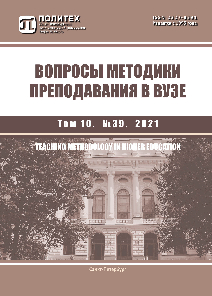Analysis of the readiness of undergraduate students of the pedagogical direction for future professional activity
The article is devoted to the primary analysis of future foreign language teachers’ readiness for professional activity through the level of their professional identity identification. The study of professional teachers’ identity at this stage is associated with the need of considering the following issues in professional activity: solving problems of interpersonal communication and mutual understanding, interaction between teachers and students, the appearance of professional burnout in the work of teachers, etc. Within the framework of the theoretical review, the definition of professional identity is given with a description of its structure. The professional identity of future teachers is a multi-component concept, including cognitive, motivational and value components. The process of professional identity formation is complex and goes through four stages: those of pre-professional development, search and choice of profession, vocational training, and independent work. Even though the training of foreign language teachers includes pedagogical practice, that is often not enough. In addition to teaching and mastering their subject, they have to resolve many more difficult cases, which may appear as a surprise to many young professionals. Insufficient formation of professional identity can cause a number of problems in pedagogical practice. Identification of the readiness level of the first-year undergraduates in the pedagogical direction of preparation for the future professional activity was carried out drawing on a questionnaire, including questions reflecting the cognitive, motivational and value aspects of the teacher's professional identity. Drawing on the results of the survey, a conclusion was made on the degree of professional identity formation among young students – future teachers.



